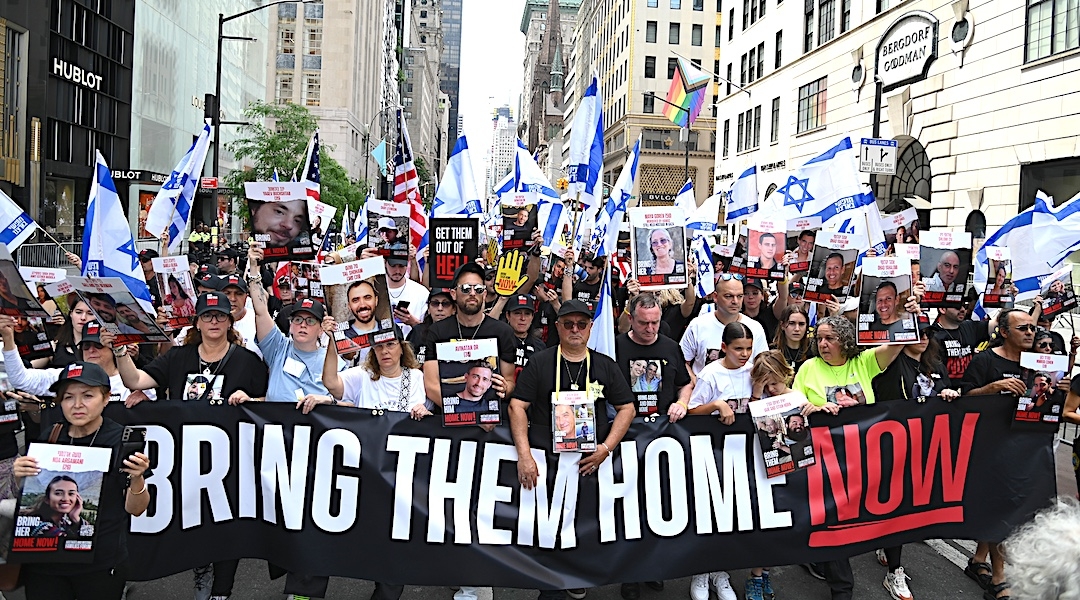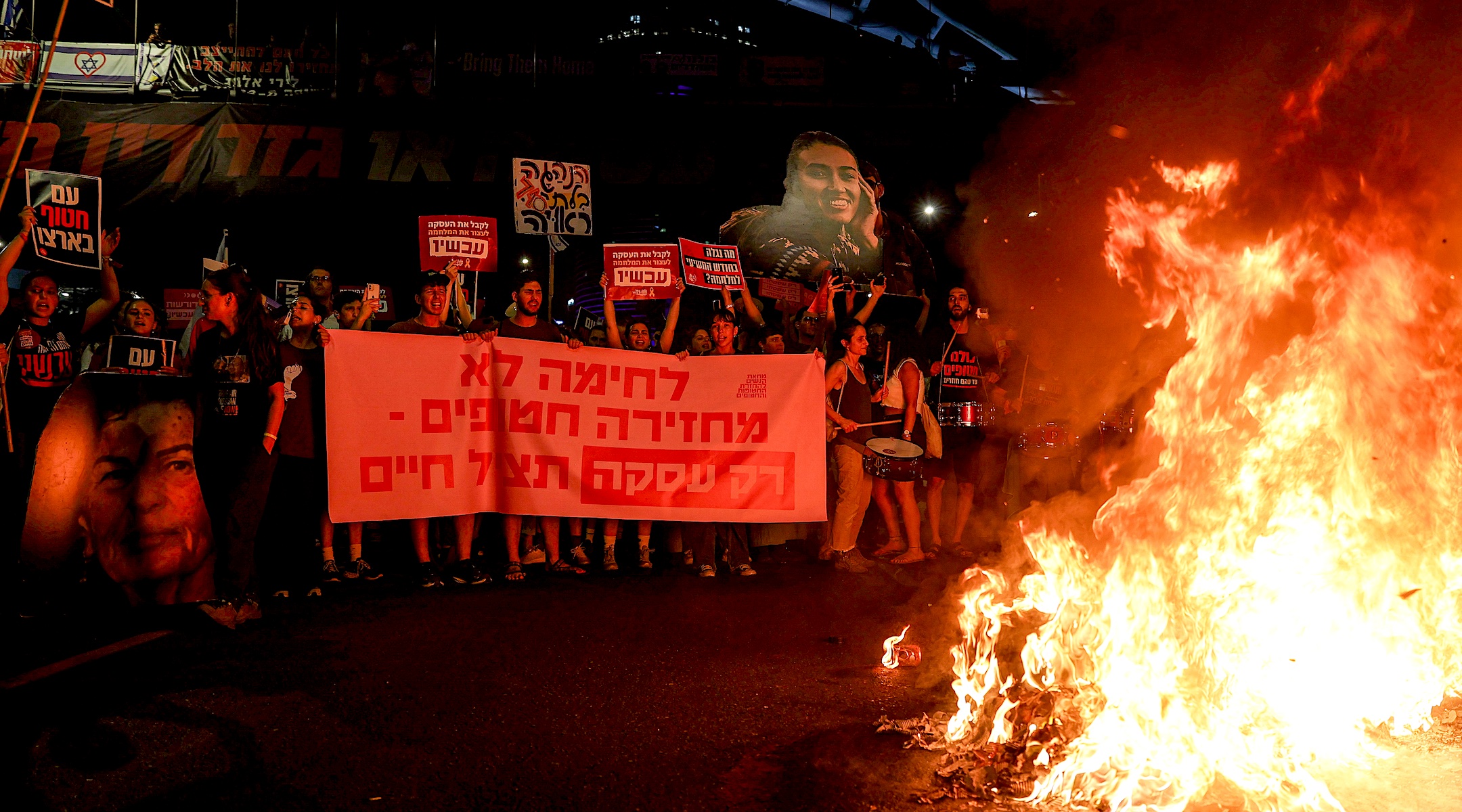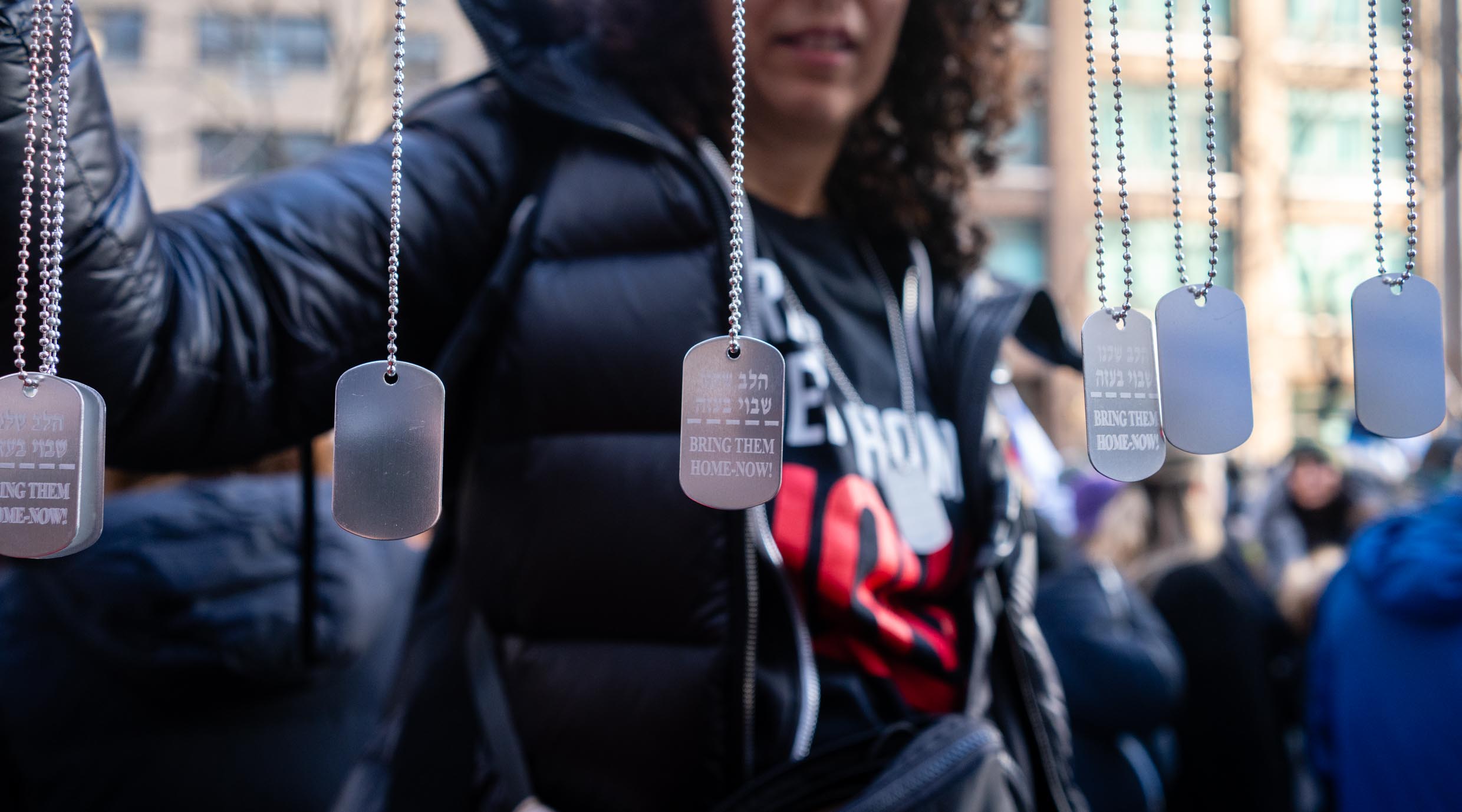‘Bring them home’ means different things to Israelis and American Jews
The messaging behind the “free the hostages ” activism range from harsh criticism of the Netanyahu government to apolitical calls for solidarity

Marchers call for the release of hostages in Gaza at the annual Israel parade in New York City, June 2, 2024. (Courtesy JCRC-NY)
Last Sunday in New York, thousands marched in the annual pro-Israel parade, less a celebration this year than a rally for the hostages held by Hamas since Oct. 7. The parade’s sponsor, New York’s Jewish Community Relations Council, said its goal was “sending an urgent message to the world: ‘Bring Them Home Now!’” — raising awareness of the plight of the captives, without calling for specific actions to free them.
By contrast, the day before, tens of thousands of protesters in Tel Aviv called on the government to strike a deal with Hamas for a ceasefire in the eight-month war in exchange for the return of the 120 remaining hostages, living and dead. Coupled with calls for the dismissal of Prime Minister Benjamin Netanyahu and for early elections, the rally in Israel was sharply political and specific in its demands.
Last week, one of the rally’s organizers, “We Are All Hostages,” wrote an open letter to “American Jewish Organizations” asking them to demand that Netanyahu accept a hostage release deal and end the war. “Please, do not remain silent in the face of his criminal abandonment of Israeli citizens in captivity,” the group wrote. “Do not allow him to sabotage this deal.”
The two rallies and competing messages demonstrate a divide between many American Jews and Israelis, both marching under the banner of “free the hostages.” In Israel, many if not most advocates for the hostages have been vocal in criticizing their government and calling for a ceasefire; in the United States, Jewish groups and individuals have been invoking the hostages either in apolitical gestures of solidarity, or to defend the aims of the war.
“It’s really clear that in Israel ‘bring them home’ is directed at the government,” said Rabbi Jill Jacobs, CEO of the liberal human rights group T’ruah, who has written on the subject after attending a number of the rallies on visits to Israel. “Among U.S. Jews, there seems to be a belief that ‘bring them home’ is directed at everyone but Israel.”
The contrast in messaging is captured in an ubiquitous symbol of the “free the hostages” movement: replica dog tags with either the names of captives or messages of solidarity. American Jews have been wearing them since shortly after Oct. 7, the way a previous generation wore bracelets for Vietnam War P.O.W.’s or Soviet Jewish “prisoners of conscience.” Because they make no specific political demands, the necklaces have become Rorschach tests for the right, left and center.
The pain and contradictions of a Jewish world in turmoil are reflected in the meanings they attach to the hostage discourse: solidarity, grief, justifications for Israel’s war on Hamas, anger at the Netanyahu government, solace for the families of the captives, and a simple human and Jewish need to keep the plight of the missing in the spotlight.
UJA-Federation of New York, the main funder of the JCRC, sells $18 “Dog Tags for Hostages,” explaining their function in apolitical terms. “These dog tags — the same ones distributed throughout Israel by the Hostages and Missing Families Forum — remind us (and others!) to keep the remaining hostages still being held in Gaza constantly in our thoughts until all return home to their families,” according to its website.

Israeli protestors set up bonfires and blocked roads in Tel Aviv during a demonstration demanding a hostage swap deal, May 5, 2024. The banner reads, “Fighting will not free the hostages — only a ceasefire will save lives.” (Photo by Itai Ron/Middle East Images/Middle East Images via AFP)
On its own website, the Hostages and Missing Families Forum — the largest of the groups representing the families of the captives — offers the dog tags with a similar description, calling them symbols of “unwavering commitment to bringing hostages and missing people home.”
But while their messaging regularly focuses on Hamas atrocities and its violations of international law, the forum and its members have also been pointed in their domestic politics. In December, 80 days after the Hamas attacks, Nisan Calderon, brother of hostage Ofer Calderon, spoke at a rally organized by the forum. “I call on members of the cabinet and the government to work for the return of all hostages now,” he said. In March, 150 days after the attack, he spoke at a Health Committee meeting at the Knesset, complaining that no one from the Israeli government had contacted him — a common complaint among hostage families.
Yifat Calderon, cousin of Ofer, is a principal in We Are All Hostages.
Historically, American Jews have been uncomfortable publicly criticizing the Israeli government from afar. At the same time, many are now facing their own insecurity in the wake of the war and rising anti-Israel and antisemitic activism.
“I wear [the dog tag] because I feel a connection to Israel. And I feel that since I’m not there, it’s kind of the least that I could do,” said Shelly Talmud, a mother of three in East Brunswick, New Jersey. Two of her sons have served in the Israeli military as “lone soldiers,” and her oldest, still living in Israel, is a reservist. “I feel it is important to show people that we haven’t forgotten about the hostages.”
But Talmud also wears the dog tag, alongside a Star of David, as an expression of identity and defiance. “I’m very aware when I am wearing it that I am out there as Jewish, and it’s a little frightening. But it’s important to other Jewish people to see that I’m wearing it,” she said. “And if somebody would start up with me, I’d say, ‘This has nothing to do with what’s going on in Gaza. That’s a whole ‘nother conversation. I’m just talking about the hostages and that they need to be released. I’m not getting into a political thing with you.’”
Since Oct. 7, Jews in Israel and the United States have developed an array of symbolic, public and ritual responses to the tragedy in Israel. They include empty “Shabbat table” displays representing the captives, empty chairs in synagogues and at the seder table, pieces of masking tape with the number of days since the hostages were taken and “kidnapped” posters featuring images of the hostages. “Hostages Square” in Tel Aviv has become a pilgrimage site for Israelis as well as American Jews visiting the country.
Coming soon after Oct. 7, said Rabbi Vanessa Ochs, emeritus professor of religious studies at the University of Virginia, these responses “were about solidarity with Israel, and they were saying, ‘My heart aches.’”
As the war ground on, and Israel faced more criticism both at home and abroad, symbols like the dog tags took on new meanings. “They had a quality of ‘I am with Israel no matter what. I will not criticize Israel,’” said Ochs, who is a scholar of new rituals and Jewish material culture. “And for people who are critical of Israel it became a symbol of abdicating your role and responsibility for thinking about the consequences of what Israel is doing right now militarily.”
Ochs said she was given a dog tag by a neighbor, “and I was delighted to have it because my heart was breaking. But I never wore it, because I wasn’t sure what meanings it would have in the different contexts in which I found myself.”

Dog tags symbolizing support for Israeli hostages held by Hamas are displayed at a rally near the United Nations, Jan. 12, 2024. (Luke Tress)
Amanda Berman, executive director of the “unapologetically Zionist” Zioness Movement, understands that to many Israeli activists, freeing the hostages means supporting a ceasefire. But by wearing a dog tag (next to a chai and other Jewish symbols), she’s expressing a different view of what it means to be “political.”
“As an American Jew and as a human being of conscience, I want the war to end. But the question since the afternoon of Oct. 7 has been, what has to happen in order for the war to end? And for me, that pressure should have been on Hamas to release the hostages and to stop shooting rockets and missiles into Israeli population centers and to stop threatening the sovereignty of the Jewish state,” she said. “And the minute that happens, the war will be over.”
Berman’s may not be a pro-war message, but it focuses responsibility on Hamas instead of the Netanyahu government. And it was similar to a message conveyed by a delegation from Kibbutz Be’eri, a southern Israeli community hard hit during the Hamas attacks, that marched in New York’s Israel parade. Or Gat, whose sister Carmel is a hostage and whose mother Kinneret Gat was murdered that day, told JTA that the goal of their 10-day trip to the U.S. was to raise awareness of the hostages and to speak about Hamas, “a terror organization that’s controlling Gaza and is the one that most hurts the Palestinian people.”
That too is a political message, but aimed at the broad goal of shaping public opinion about the war and its aims — a message endorsed by the Israeli government. “I’m wearing a #BringThemHomeNow dog tag in every interview and press conference as a reminder, for myself and the world media, why we’re fighting,” Eylon Levy, at the time an official Israeli government spokesman, tweeted in December.
The We Are All Hostages movement wants more from American Jews, and said in their letter that they are available to speak to Jewish groups to press their case. “Your voices are crucial to saving our family members. Your voices can help end this war. Lives hang in the balance,” they wrote. “Our families hang in the balance. We need you with us.”
Jill Jacobs of T’ruah said her group had come to a similar conclusion earlier in the war. On May 8, it issued a statement urging the Netanyahu government “to make a hostage and cease-fire deal and bring the hostages home.”
She is aware, however, that even as the pro-Israel right abhors such implicit criticism of Israel, the pro-Palestinian left resists empathy for the hostages — and that the “kidnapped” posters were often torn down or covered.
“There’s this idea [on the left] that it’s somehow a contradiction between calling for a ceasefire and saying anything about the hostages,” she said. “I wish that people on the far left in the U.S. understood that a ceasefire and bringing home the hostages are actually the same things. They’re not different sides.”
In Washington, D.C., since shortly after the Hamas attacks, about 100 people gather every Sunday for a “Bring Them Home Now” rally in front of the American Red Cross headquarters. Because they are Israeli Americans — members of the group UnXeptable D.C., formed before the war to protest Netanyahu and his proposed judicial reforms, later pivoting to support Hamas’ victims, aid Israel’s vulnerable populations and advocate for the release of the hostages — the vigil organizers have tried to straddle the line between what the cause means back home and to non-Israeli American Jews.
“At first we were very careful not to be political, and the strongest goal we had was to keep the issue of the hostages in the public eye,” said Vered Guttman, a food writer, one of the rally organizers and a representative of the Hostages and Missing Families Forum in Israel. “After about three months we were starting to be more frustrated with the Israeli government. And as more time passed, it became very clear that it’s a political issue that we could not ignore — or ignore what was happening in Gaza.”
The speakers started to demand that the government sign a deal, and to praise President Joe Biden for talking about the hostages and an endgame to the war in ways that Netanyahu avoided. Most of those attending the vigil are American Jews, who keep returning while occasionally bristling at the politics of some of the speakers.
“We’re kind of gentle,” said Guttman, noting that while UnXeptable speakers will call on the Israeli government to sign a ceasefire deal, they invite guest speakers from across the political spectrum, from Sen. Chris Van Hollen (D-Maryland), a frequent critic of Israel, to Robert Satloff, executive director of the Washington Institute for Near East Policy, which has close ties with Israeli officials.
Such an approach, she said, “makes our tent wider, and it brings a new audience to the discourse.”
This article originally appeared on JTA.org.
















